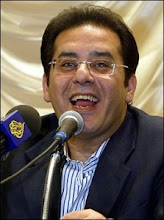The fate of imprisoned opposition leader Ayman Nour is still unsettled, reports Mona El-Nahhas
The Administrative Court announced on Tuesday that any decision on whether Al-Ghad Party leader Ayman Nour will be released must wait until 26 June, when official medical reports into the opposition leader's state of health -- asked for on 22 May -- are due to be issued. Meanwhile, the court ruled that Nour's defence counsel -- who had complained of procrastination in preparing the official report -- could present evidence from independent medical specialists regarding their client's health.
The court ruling means that if the official report, prepared by the Forensic Medicine Department, is not presented within two weeks then the court will rely on independent assessments of Nour's health in delivering its ruling, raising hopes among supporters of the 43-year-old Nour that his 18 months behind bars might soon come to an end.
The judge presiding over the appeal for Nour's release stressed the court would not swayed by national or international calls for Nour's release, and the decision would be based entirely on the state of Nour's health. The former presidential election candidate suffers from diabetes, heart problems and hypertension and last year underwent heart surgery while in prison.
Nour's lawyer, Amir Salem, said the court's decision was a "historical ruling", adding it represented "a severe blow to administrative bodies used to ignoring court requests".
Nour's wife Gamila Ismail told reporters she had never expected the medical report to be made available to the court panel, which was why she was treating the court ruling as a victory.
But while Salem sounded upbeat, saying any ruling in Nour's favour must be implemented immediately, Ismail sounded a more cautious note, saying she feared US pressure for her husband's release could make the regime more stubborn about the case.
Legal sources say there is a possibility the Interior Ministry will ignore any ruling in Nour's favour, using the struggle between several legal bodies, including Prosecutor-General Abdel-Meguid Mahmoud's office, over who has the right to judge the case. While some observers worry about the negative consequences of US pressure for Nour's release, others point to the case of academic and pro-democracy activist Saadeddin Ibrahim. Sentenced by a state security court in 2001 to seven years in prison for receiving foreign funds without government permission, Ibrahim was released in 2003 following enormous US pressure.
Ahead of Tuesday's hearing session international calls for Nour's release increased.
During a short visit to Egypt this week a delegation from the Alliance of Liberals and Democrats for Europe talked with Egyptian officials about Nour's health.
"We are following Nour's case, and we are waiting for the court verdict, expected to be passed on Tuesday," said Sarah Ludford, a member of the European parliament.
During a conference on democracy held in the Czech Republic last week US President George W Bush called directly for Nour's release. "I look forward to the day when conferences like this one include... Ayman Nour of Egypt," Bush said.
The point was subsequently underlined by the US State Department.
"We believe that Nour should be released. We hope this could be achieved. We'll leave it to the Egyptian government to define the way by which it expresses its reactions," said Tom Cass, deputy spokesman of the US State Department.
"What Bush said concerning Egypt is an unacceptable intervention in our internal affairs," insisted Foreign Minister Ahmed Abul-Gheit following Bush's speech.
The National Council for Human Rights (NCHR) also weighed in with its disapproval. "Bush's statements concerning Nour's case place Egypt under no obligation," said NCHR Secretary-General Mokhles Qotb. "The law defines the legal channels that are pursued in this and similar cases."
Following a meeting of the Al-Ghad Party's higher committee a statement was released on Friday condemning Bush's statements and any external intervention in the case.



